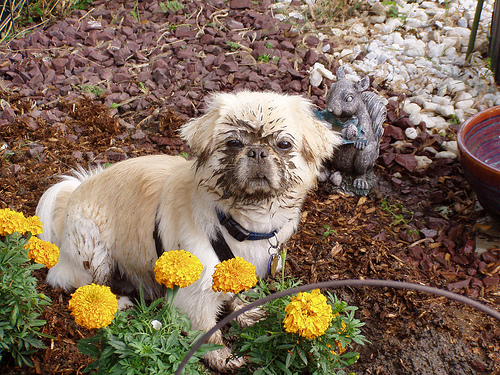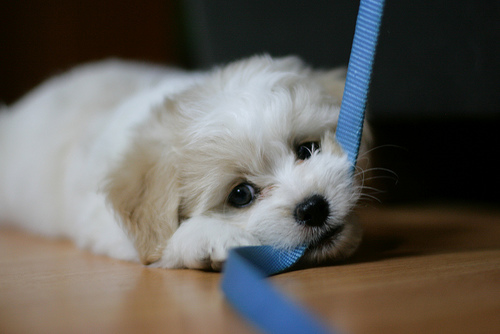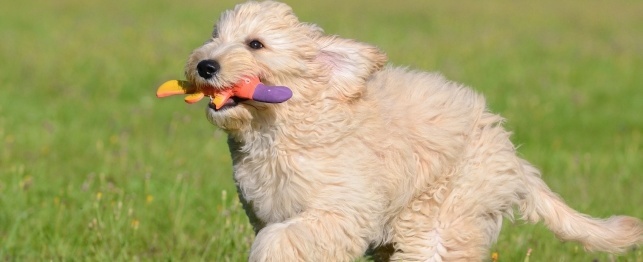Training a puppy can be frustrating, especially when you are just beginning the task. But, if you properly use the above advice, you can have a better relationship with your dog and better understand what they need.
One of the easiest ways to prevent chewed furniture is to put your dog outside, or keep him in his cage indoors while you are away. If you can't put him outside due to regulations or weather, use dog gates to make certain rooms inaccessible, and put valuables in high places.
If you wish to succeed when training your dog, you should commit yourself to a particular length of time consistently. Dogs will learn orders after you repeat them for a while. Spending even a small bit of time with the dog can show it that you are reliable. Your dog will see you as the pack leader.
Do not allow your dog to stubbornly decide which commands he will pay attention to. If you don't intend to follow through with enforcing a command, save it for later.
When you are using your dog's name negatively while scolding him, be sure to repeat it several times lovingly as well. The dog must realize that his own name can be something associated with positive things and that he should never fear coming to you if called.
To prevent your dog from barking, try to desensitize them to the cause of their barking. Triggers can include strangers, loud sounds or new places. Once the dog is acclimated, he'll begin to see there is not reason to bark.
Your dog's training should never end. Your dog doesn't stop learning just because it's no longer a puppy. By continually reinforcing desired behaviors, your dog will continue to behave appropriately.
Successful dog training for walks means being aware of any dogs or other animals you will encounter while walking. It's true that certain breeds or animals are more aggressive than others, and you must also take into account that not all pet owners take responsibility for their dogs. If you see a dog acting aggressively or fearfully, avoid that dog.
Understand when it may be time to call in the professionals. It may be necessary to seek professional assistance if your dog training is not proceeding as you expected it to. A professional can help teach you the right training methods, that will work for your dog.
See to it that you're not giving your pet wrong signals when it behaves badly. Your dog picks up on your reactions to things so if you laugh at bad behavior they will take that as it is okay to continue what they are doing. If you do, training will be damaged. Even when it is amusing, you have to correct your dog, not reward him with laughter.
You never want to give your dog a punishment during training. If your dog does not follow the correct behavior, instead of punishing him, gently teach him what to do instead. Training is a time to teach and talk with your pet; the process is all about building a positive relationship.
Even an old or troubled dog can be helped with a bit of training, and the tips here should start you off on the right paw. Stay patient while using these tips. Armed with a loving hand and the wisdom in the tips discussed here, you will enjoy many years of devoted companionship with your pet.

 How To Deal With Dogs That Dig
How To Deal With Dogs That Dig
Digging can be a fr
How To Deal With Dogs That Dig
How To Deal With Dogs That Dig
Digging can be a fr
 Teaching Your Dog Polite Leash Skills - Canine Manners 101 Dog Training Series
Teaching Your Dog Polite Leash Skills
This article i
Teaching Your Dog Polite Leash Skills - Canine Manners 101 Dog Training Series
Teaching Your Dog Polite Leash Skills
This article i
 Doggie Play Dates: Are They for Your Dog?
Doggie Play Dates: Are They for Your Dog?
Doggie Play Dates: Are They for Your Dog?
Doggie Play Dates: Are They for Your Dog?
 Games for Dogs: Bobbing for Biscuits
Games for Dogs: Bobbing for Biscuits
Games for Dogs: Bobbing for Biscuits
Games for Dogs: Bobbing for Biscuits
 Five Games That Will Delight Your Dog
Five Games That Will Delight Your Dog
Five Games That Will Delight Your Dog
Five Games That Will Delight Your Dog